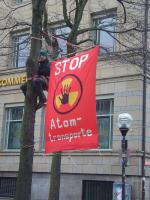Anti-nuclear activists demonstrated at ten German locations on 8 March against nuclear material shipping by Hamburg-based Hapag-Lloyd, the world’s fourth-largest shipping company operating about 200 vessels. Through the port of Hamburg Hapag-Lloyd regularly ships uranium concentrate and uranium hexafluoride from Canada to Gronau in Germany and Narbonne in France for processing into fuel for nuclear power stations. One of many objections to this transportation is that it enables nuclear power production to continue worldwide although the German government has pledged to end it in this country by 2022. Eight nukes are still running here.
Hapag-Lloyd AG is a stock company of which the city of Hamburg, ruled by Social Democrats, is the second largest shareholder with 23.2%. Recently the Chilean Compañía Sud Americana de Vapores (CSAV) became the biggest shareholder with 34%. Others are Kühne Maritime (20.8%), travel provider TUI (13.9%), insurer Signal Iduna (3.3%), HSH Nordbank (1.8%), M.M.Warburg & CO (and two private investors) (1.8%) und insurer HanseMerkur (1.1%).
In the northern port city Kiel climbers strung two banners against nuclear transportation between two trees in front of a Hapag-Lloyd travel agency and handed out satirical flyers.
Demonstrations were also held at Hapag-Lloyd and TUI travel offices elsewhere. Hapag-Lloyd has sold travel agencies to TUI, but TUI remains a 13.9% shareholder of the shipping line, and thus shares in its business with nuclear materials.
This was argued by the activists in Kiel, who called on passers-by to shun TUI when booking vacations.
German criticism of Danish nuclear dump plans
In other nuclear news, criticism is hotting up in the northernmost German state, Schleswig-Holstein, of plans in neighbouring Denmark for a final repository for low and medium radioactive wastes.
The energy ministry in Kiel says one issue in focus is the possibility of the dump taking special waste such as irradiated fuel from experiments. In general, the Danish dump is to take in low and medium level waste from firms and research activities.
One of six sites being considered is Rødbyhavn on the south Danish island Lolland, 27 kilometres airline from the German Baltic tourism and farming island Fehmarn.
Submitting an opinion on environmental compatability, the Kiel ministry argued that joint storage of fuel elements with low-level and medium radioactive waste greatly increased security demands.
Kiel’s statement also pointed out that Rødbyhavn is located close to busy passenger and goods traffic and tourist resorts. Many on Fehmarn feared that a nuclear dump at Rødbyhavn would massively hit their tourism business.
Kiel‘s paper also suggests that important information is lacking about waste properties, possible malfunctions and waste transportation. According to the ministry, the Danish documentation does not rule out foreign nuclear waste being moved to Denmark on German roads to improve the economics of the dump.

